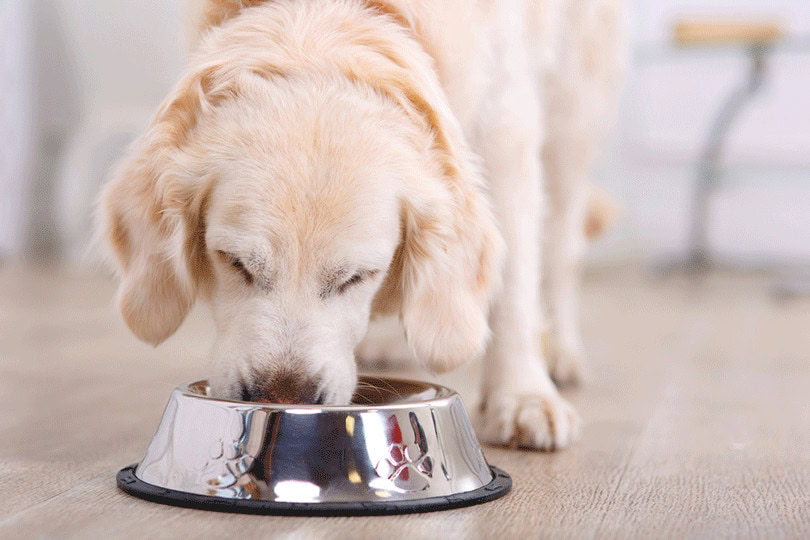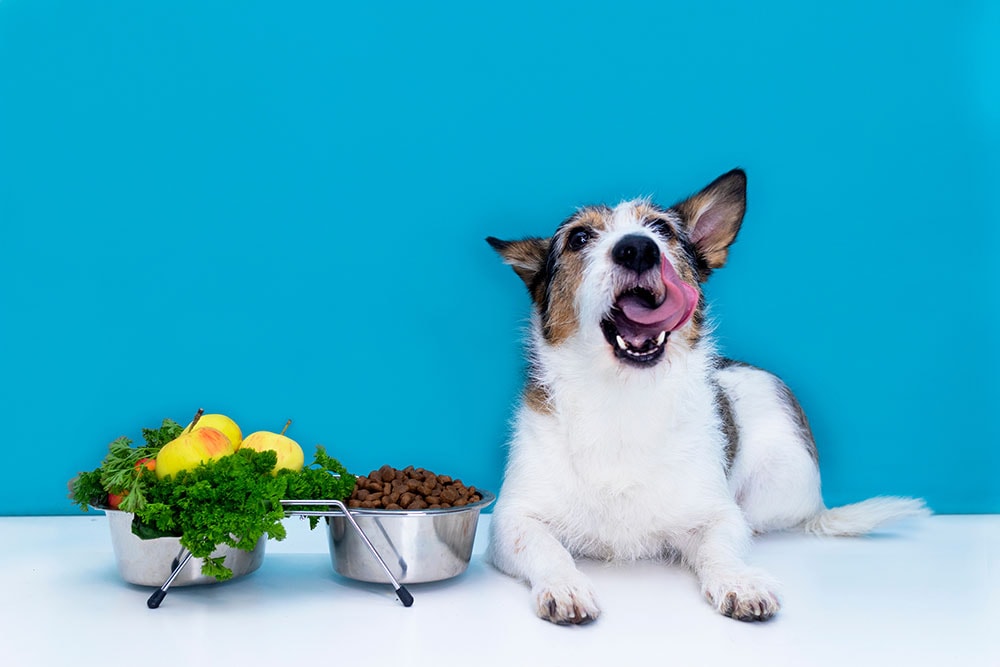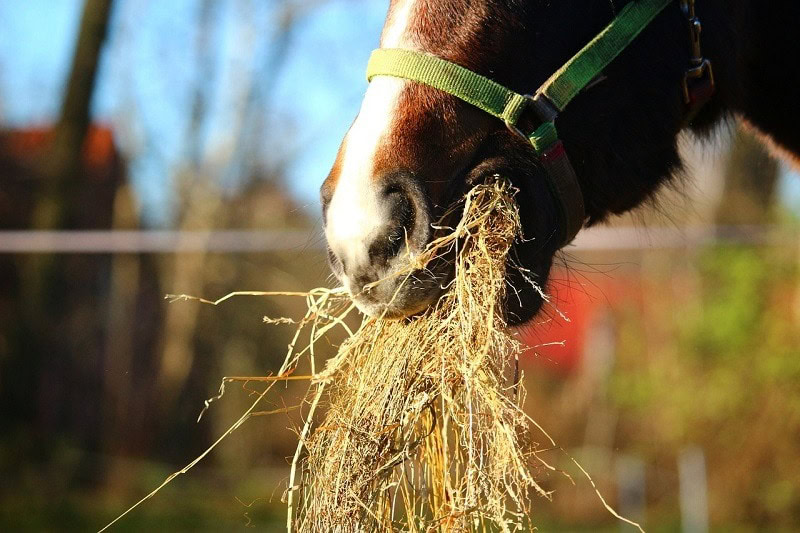VET APPROVED

The information is current and up-to-date in accordance with the latest veterinarian research.
Learn more »Click to Skip Ahead
Humans adopt a vegetarian diet for a variety of reasons, including food intolerances, dislike of meat, and ethical objections to killing animals for food. For some, it is considered a somewhat easier path to follow than veganism, which excludes ALL animal products and by-products, including eggs, dairy, honey, silk, and any other materials that are sourced from animals.
A vegetarian diet includes no meat or meat by-products (e.g., gelatin), but will usually still include eggs, honey, and dairy. Although it is possible to find healthy vegan diets for dogs, it can be trickier to ensure they are getting everything their bodies need. So what about a vegetarian diet? Can dogs be vegetarians? The answer is yes. Dogs can be vegetarians.
Are Dogs Carnivores?
The canine diet has evolved over the thousands of years of domestication from their primarily carnivorous ancestors, although even the wolf will consume plant matter if needed. As wolves spent more time around humans, their digestive system gradually adapted to different food types, including fruits, vegetables, grains, and whatever else they were given or scavenged.
Today, dogs are typically classified as facultative carnivores or omnivores.

What’s the Difference?
A facultative carnivore can and will eat plant-sourced foods if necessary, but prefers and is more adapted to a carnivorous diet.
An omnivore has a digestive system that is anatomically and physiologically adapted to digest and metabolize both meat and plant matter,1 and can eat one or the other, or a mixture of both, provided they are getting all the necessary nutrients.
As dogs have become further removed from their wild origins, their digestive systems have changed, and most experts now agree that they are leaning towards an omnivorous classification. However, some breeds, such as the Siberian Husky, Malamute, or Shiba Inu, who are more closely related to wolves, should still be treated as facultative carnivores.
It’s easy to picture a Husky catching and consuming a rabbit for dinner, but it’s not something one would expect from a Pug or Papillon!
Why Feed Dogs Vegetarian Food?
Now we understand that most dogs can be fed a vegetarian diet, the next thing to ask is why we are doing it. Dogs don’t experience the guilt or moral dilemmas that humans feel about eating meat, and we’re pretty sure that sustainability and environmental impact are low on their list of priorities, so they’re not making an ethical choice to stop eating meat.
Many vegetarians are uncomfortable with having meat in the house or feeding it to their pets. If this is the reason for introducing your dog to a vegetarian diet, make sure you are considering their health first. Some dogs may thrive on a meat-free lifestyle, but others may not do as well, so it’s important that we put their health and welfare before our own personal principles.
Dogs with food allergies or intolerances may have adverse reactions to a long list of foods, and changing to a vegetable-based diet may help get their digestive or skin issues under control. As meat protein is usually the main cause of food allergies, eliminating it completely may really work for your dog.
If you are not sure whether your dog would be suited to a vegetarian diet, talk it through with your vet.
If you’ve decided that a vegetarian diet is the way to go, let’s talk about how to do it safely.

Make a Slow Transition to Vegetarianism

If you want to feed your dog a vegetarian diet, it’s important to make a slow transition to the new diet. Whenever you change from one food type to another, it’s important to do so gradually, giving the gut time to adjust. The same is true when switching your dog from a non-vegetarian diet to a vegetarian diet. The key is to take it nice and easy!
A period of 2 weeks to a month is a good transition schedule to follow. Start by adding ¼ portion of the new food to ¾ portion of the existing food. Increase the amount of new food and decrease the amount of old food by ¼ every 3 to 5 days until you’re feeding your dog nothing but vegetarian food. Making a gradual transition to the new food will help your dog’s digestive system adjust gradually.
During the transition period, keep an eye on your dog’s health. If his stool becomes loose or he appears to have an upset tummy, slow the process down so things can get back to normal. Some dogs can easily transition to a new diet, while others can take longer due to stomach sensitivity. If in doubt, contact your veterinarian for advice.
Use Probiotics
The digestive tract contains bacteria that aid digestion by breaking down food through the process of fermentation. This is particularly important for herbivores and omnivores, as these microorganisms are essential for breaking down fibrous plant material.
Carnivores or animals that eat more meat than plant material may not have enough or the right balance of bacteria to cope with a sudden influx of vegetables and grains, so one of the best things you can do to help your dog adjust to a vegetarian diet is to provide them with probiotic support. Probiotics are readily available from your vet and pet stores. Be sure to use supplements formulated for dogs, as the bacterial species and concentration of human probiotics may be different.
Choose a Good Quality Vegetarian Dog Food
The vegetarian dog food you choose to feed your pet must have all the nutrients your dog needs. The Association of American Feed Control Officials (AAFCO) is an organization that sets the standards for model pet food regulations in the United States.
When shopping for commercial vegetarian dog food, look for food that meets the AAFCO guidelines to ensure it contains a formula that’s been third-party tested for nutritional content. This means you’ll have to read the label carefully to ensure the dog food is nutritious, so be prepared to do a little bit of work!
What’s in Vegetarian Dog Food?
If you’re wondering what is in vegetarian dog food, we’ve got the information you need! Unlike regular dog food that contains meat like beef, chicken, turkey, lamb, and meat by-products, vegetarian dog food is completely meat-less.
While vegetarian dog food doesn’t contain meat, it may contain other animal products like dairy and eggs. Vegetarian dog food typically contains a variety of ingredients such as:
- Grains like wheat, barley, oats, etc.
- Lentils
- Soya
- Brown rice
- Corn
- Potatoes
- Quinoa
- Peas
- Chickpeas
- Vitamins and minerals
- Omega 3 and Omega 6
By including a wide variety of ingredients, we can ensure they are getting everything they need. Although it is possible to make your own vegetarian dog food at home, it can be trickier to get the right balance of nutrients, which is why we recommend purchasing professionally prepared, AAFCO-approved food.
If you really want to make your dog’s food at home, be sure to do your research and speak to a veterinarian or canine nutritionist first. There are various supplements that can be purchased to add to homemade foods to make sure your dog doesn’t suffer from any deficiencies.
What About Flavor?

It’s common for a skeptic to find it hard to believe that their dog is going to jump for joy over being fed peas or corn. If you’re concerned your dog may not eat vegetarian dog food, you should know that the most popular meat-less dog foods are flavorful. These foods are not full of artificial flavor either. These dog foods contain high amounts of natural, flavorful protein dogs tend to love.
Just like when you try to switch to new meat-based dog food, your dog will like some of the foods you offer him and snub his nose at others. This is why it’s a good idea to buy sample-size vegetarian dog foods.
Many pet stores sell small packages of dog food, including vegetarian food, so find one near you that does so you don’t end up spending a small fortune.

Final Thoughts
It is certainly possible for dogs to thrive on a vegetarian diet, as long as it consists of high-quality, nutritionally balanced ingredients.
It’s up to you to decide what type of food to feed your dog. If you’re a vegetarian and want your dog to be one too, make the transition to vegetarian dog food a gradual, smooth one. Some dogs will take to a vegetarian diet readily, and many will actually be healthier for it. However, some individual dogs and breeds may not do well without meat, so pay close attention to their overall health, vitality, and digestion. Take the time to read dog food labels so you end up choosing food that offers your dog all the protein, vitamins, and minerals he needs to live a healthy and happy life, and help ease the move to a vegetarian diet by adding probiotics.
Featured Image Credit: Daria Lixovetckaym, Shutterstock












